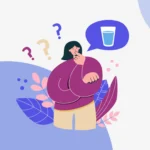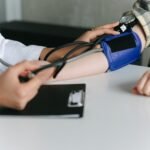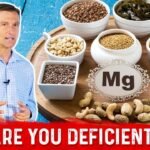Table of Contents
Learn about the signs and symptoms of low potassium, its causes, and effective treatments. Discover how to prevent potassium deficiency and maintain optimal health.
Potassium is an essential mineral that plays a vital role in numerous bodily functions, including the proper functioning of enzymes and cellular pumps, particularly the sodium-potassium pump.
This pump is crucial for generating energy for the nervous and muscular systems. Low potassium levels, or hypokalemia, can lead to a range of symptoms, such as muscle weakness, breathing difficulties, constipation, muscle cramps, twitching, arrhythmias, hypertension, fatigue, alkalosis, insomnia, higher pulse rate, and pulsatile tinnitus.
Causes of low potassium can include inadequate dietary intake, excessive sodium consumption, fluid loss through vomiting or diarrhea, diuretic use, stress, insulin resistance, and certain medical conditions like Cushing’s syndrome.
Treatment involves consuming potassium-rich foods like leafy greens, avocados, squash, lima beans, and salmon. Electrolyte powders or supplements may also be recommended. Preventive strategies include maintaining a balanced diet and managing conditions that can lead to potassium deficiency.
In this article, we explore the importance of potassium, the symptoms and causes of low potassium levels, and effective treatments and prevention methods to ensure optimal health.
Symptoms and causes of low potassium
Today , we’re gonna talk about low potassium .
The signs , the symptoms , the causes , the treatment , all the details about potassium .
I’ve done a lot of topics on potassium .
I’m always updating my topics.
I’m finding new information , and I’m also reminding people about things that are really , really important
Why do we need potassium?

And out of all the minerals , I think potassium is at the top of the list as far as importance .
So the reason why we need potassium mainly is because it’s a part of a certain enzyme or a pump in all of your cells called the sodium and potassium pump .
That is the pump that keeps , these 2 minerals separated to a certain degree to create a battery effect in your cells .
So potassium is intimately involved in the power in the cells , and I’m talking about the power to generate energy for your nervous system primarily as well as your muscular system .
All your muscles .

And I’m not just talking about your skeletal muscles from your legs and your arms , but the muscles in your colon , the muscles in the lung , which is the diaphragm , which is a little bit different , but that’s not a skeletal muscle , but it allows you to breathe .
So that’s a really , really important function right there .
It also is involved in pH , and potassium also works with other minerals like sodium , for example .
It can also work with magnesium .
And so in the diet , for example , if 1 is going too high , the other 1 will also need to go up as well .
For example , you don’t have to worry about consuming too much sodium as long as your potassium is at least twice as high .
And so the average person needs like 47 100 milligrams of potassium and like half of that sodium ideally .
But that can increase if you’re going up with the sodium .
But the average person is not consuming even close to what they really need of potassium .
And this is why this video is important because most people are deficient in potassium .
| Category | Details |
|---|---|
| Role of Potassium | Essential for muscle function, nerve transmission, and maintaining fluid and electrolyte balance. |
| Signs and Symptoms of Low Potassium | – Muscle cramps – Weakness – Fatigue – Constipation – Irregular heartbeats – Tingling or numbness – Nausea – Vomiting – Bloating – Abdominal pain |
| Causes of Low Potassium | – Excessive loss through urine or digestive tract (diuretics, diarrhea, vomiting) – Poor dietary intake – Excessive sweating – Chronic kidney disease – Medications – Hormonal imbalances – Conditions like diabetes |
| Health Effects of Deficiency | – Increased risk of hypertension and cardiovascular diseases – Muscle paralysis – Poor digestion – Fatigue and weakness – Respiratory failure – Cardiac arrest |
| Treatment for Low Potassium | – Increase dietary intake of potassium-rich foods – Oral potassium supplements – Intravenous potassium for severe cases – Address underlying causes (medications, chronic conditions) |
| Potassium-Rich Foods | – Bananas – Avocados – Leafy greens – Beans – Nuts – Seeds – Potatoes – Fish |
| Dr. Berg’s Recommendations | – Monitor for signs of deficiency – Regular check-ups with healthcare providers – Maintain a balanced diet for overall health |
| Importance of Monitoring Levels | – Regular check-ups with healthcare providers – Monitoring for signs of deficiency – Maintaining a balanced diet for overall health |
So you should know the symptoms .
You should know how you become deficient .
Understanding hypokalemia
It’s not always , from your diet , but the medical term for low potassium is hypocalinemia .
That means low potassium in your blood .
The thing you need to know with potassium is that 98% of all the potassium is located inside the cell .
Only 2% is outside the cell in your blood .
So when you get a blood test , you’re really only measuring a very tiny bit , like 2% of all your potassium in your body .
So it’s not the best way to know what’s going on , deeper inside the body .
An intracellular potassium test is more difficult , and sometimes it’s hard to find a lab that will do that .
Low potassium symptoms
So let’s kinda go through the symptoms of low potassium .
Number 1 would be muscle weakness .
Let’s say you’re climbing up the stairs and you’re like , oh my gosh , my legs are just so heavy , or you’re starting exercise and you just don’t have the gas , you just feel kind of tuckered out .
That can be a potassium deficiency .
This is why it might be good sometimes to take an electrolyte powder with potassium to get more energy while you’re exercising .
A lot of times people will feel a significant difference with that .
Now we also have your lungs , which is controlled by the diaphragm .
So in other words , a lack of potassium could affect your breathing .
Right ?
It’s harder to breathe .
A lack of potassium can affect the colon muscles , the peristalsis , the pumping action of your digestive system , and that can show up as constipation as a symptom .
And also you can notice , cramping in your calves , in your feet , in other parts of your body .
You can even notice , twitching , but also twitching could be a lack of calcium as well , or even magnesium .

A lot of these minerals kinda cross over , so cramps in your calf could be potassium .
It could be magnesium .
It could be calcium .
So this is why the topic to kind of learn a little bit more about the overview of this 1 mineral .
Another common symptom is arrhythmias , the heart rhythm .
Another 1 would be hypertension as in high blood pressure , and even as that might relate to vascular stiffness .
In other words , potassium helps keep the arteries soft , okay , to prevent high blood pressure .
So 90% of all , hypertension is called essential , which means unknown cause .

I think a good portion of that is either a potassium deficiency , insulin resistance , or a low vitamin d situation .
Another symptom , it would be fatigue , and then another 1 , alkalosis .
You have a situation where potassium’s intimately involved with helping regulate your pH .
So if your blood is a little bit too alkaline or too acid , potassium is usually involved .
If the pH is , more alkaline in your blood , okay , potassium is gonna move from your blood more into the cell .
So you’ll end up with less potassium .
Potassium is also involved in the storage of sugar in your liver and in your muscles .
It’s called glycogen .
So if you’re consuming sugar , you’ll lose potassium in this in the sugar itself .
It kinda gets stuck in the liver and in the muscles .
It becomes unavailable to you unless you use up that sugar .
So , but that’s just 1 way that you can become deficient in potassium .
Another symptom would be insomnia .

Another symptom would be a higher pulse rate .
So potassium keeps your pulse rate lower .
And another condition called pulsatile tinnitus .
Now what is that ?
That is a situation where you start hearing your pulse beats .
It could be a swishing or a pounding where you put your head in the pillow and you just hear your heartbeat just pounding like that .
It’s not even necessarily a higher pulse rate .
You just hear or feel your heart rate .
That is a potassium deficiency .
What causes low potassium
So now the question is , how do you become deficient in the first place ?
It could be because you’re not consuming foods high in potassium .
That’s a common cause .
And then also you’re eating a lot of junk foods , which are loaded with sodium .
That really throws off your ratios .

Another few common causes would be , you’re losing fluids , like either your vomit , you’re doing excessive laxatives where you’re you’re losing , fluids or you have diarrhea .
That could be the reason why you’re deficient in potassium .
Another common thing is diuretics .
Diuretics many times will pull out sodium and potassium .
Stress in general can create a potassium deficiency , and this is why a condition where you have high levels of cortisol , called Cushing’s syndrome can give you signs of a potassium deficiency .
So by taking potassium , you can feel calmer .
You can have more energy .
You can have more strength in your muscles , you can have better bowel movements .
But like I mentioned before , potassium is involved with storing sugar .
So 1 way to deplete or shift the available potassium Okay ?
I have done that many times , in my twenties , in my thirties now , and I’m being very sarcastic .
I’m in my fifties , and I haven’t consumed , refined sugars in many , many , many years .

But when I used to eat a lot of sugar , I had a lot of these symptoms that we’re talking about .
This is why diabetics are usually always deficient in potassium , and they should be consuming a good amount of potassium , the higher their blood sugars are .
And so even potassium can help the insulin work better .
It can help the insulin resistance situation .
Now when someone starts , the ketogenic diet , they lose a lot of , glycogen .
Since a lot of that potassium is stuck in that glycogen , they’re gonna also lose a lot of potassium .
This is why when you’re on the ketogenic plan , I always recommend take electrolytes to get back that potassium .
So you wanna get heavy potassium , definitely a good amount of sodium as well to get your electrolytes back .
Drinking a tremendous amount of water , forcing yourself to drink like a gallon of water can definitely do it as well .
When you’re doing fasting , okay , I always recommend adding more potassium , as well as , sodium , as in sea salts , through the process .
That way , you can keep your electrolytes up because you’re not eating any food , And so you need to be taking these nutrients because you don’t really store a lot of these electrolytes for a long period of time .
So if you’re doing prolonged fasting , you could really end up with a potassium deficiency and feel faint and even pass out , you know , and that’s not a good thing .

So take your electrolytes if you’re fasting .
If you have low magnesium , that can affect your potassium as well .
Because they it takes a certain amount of magnesium to retain , potassium .
And the last thing that can affect potassium is if you get injured or you go through surgery .
And so that can shock the body .
It’s a big , source of stress , and then you could just dump your potassium and end up with hypokalemia .
Foods rich in potassium
So what are the best foods to eat your potassium ?

What about a banana ?
Well , a banana has a lot of sugar and it only has like 300 milligrams for a medium sized banana .
You need 47 100 milligrams .
So a banana is not a good source of potassium .
What about potatoes ?
Well , potato has a good amount of potassium , but it also has all that starch .
Unless you consume a raw potato , which you’re probably not gonna do , I would avoid potatoes too .
So these are the foods that are high in potassium .
At the top of the list , you have beet leaves .
If you put those in your salad , you’ll have a lot of potassium .
You also have any type of leafy green is loaded with potassium .

The salads , any of the cruciferous vegetables , any of the leafy greens will give you enough potassium .
Avocados are a very good source of potassium .
Squash and lima beans have a good amount of potassium .
Now , of course , lima beans are in the bean family .
I don’t really recommend consuming a lot of those .
If you’re gonna have them , have a small amount .

And we also have salmon , has a good amount of potassium .
So potassium is not just in vegetables , it’s also in certain meats as well .
So I hope you now have a better understanding of potassium and a better appreciation of potassium .
key Points:
Potassium is one of the most important minerals. Potassium is involved in the power of the cells. This power generates energy for your nervous system and muscular system. Potassium is also involved in pH and works with other minerals in your body.
Symptoms of low potassium:
• Muscle weakness
• Difficulty breathing
• Constipation
• Cramps and twitching
• Arrhythmias
• Hypertension
• Fatigue
• Alkalosis
• Insomnia
• High pulse rate
• Pulsatile tinnitus
Top potassium deficiency causes:
• A lack of potassium in the diet
• Junk food
• Vomiting
• Diarrhea
• Diuretics
• Stress or Cushing’s syndrome
• Sugar and refined carbs
• The keto diet (initially)
• Drinking too much water
• Fasting
• Low magnesium
• Laxatives
• Injuries or surgery
The best sources of potassium:
- Beet leaves
- Leafy greens
- Avocados
- Squash
- Lima beans
- Salmon
DATA:
https://medlineplus.gov/ency/article/000479.htm
First Signs of a Nutrient Deficiency 👉Download My FREE guide
FAQ:
What is the most common cause of low potassium?
The most common cause of low potassium (hypokalemia) is excessive loss of potassium through urine or digestive tract, often due to diuretic medications, chronic diarrhea, or vomiting. Other causes include poor dietary intake, excessive sweating, and certain medical conditions.
What is the treatment for very low potassium?
Treatment for very low potassium involves oral potassium supplements or intravenous potassium in severe cases. Dietary changes to include potassium-rich foods such as bananas, avocados, and leafy greens are also recommended. It is essential to address the underlying cause and follow a healthcare provider’s guidance.
What organ is affected by low potassium?
The heart is one of the primary organs affected by low potassium, as potassium is crucial for maintaining normal heart rhythms. Low potassium levels can lead to arrhythmias and other cardiovascular issues. Muscles and the nervous system are also significantly impacted.
What happens when a patient has low potassium?
When a patient has low potassium, they may experience symptoms such as muscle cramps, weakness, fatigue, constipation, and irregular heartbeats. Severe hypokalemia can lead to life-threatening conditions like paralysis, respiratory failure, and cardiac arrest.
Symptoms of low potassium in females
Symptoms of low potassium in females include muscle cramps, weakness, fatigue, constipation, irregular heartbeats, and tingling or numbness. Women may also experience more frequent muscle spasms and may be at higher risk for cardiovascular issues due to hormonal fluctuations.
What are the 10 signs of low potassium
- Muscle cramps
- Weakness
- Fatigue
- Constipation
- Irregular heartbeats
- Tingling or numbness
- Nausea
- Vomiting
- Bloating
- Abdominal pain
Low potassium causes
Low potassium can be caused by factors such as excessive loss through urine or the digestive tract (due to diuretics, diarrhea, vomiting), poor dietary intake, excessive sweating, chronic kidney disease, and certain medications. Hormonal imbalances and conditions like diabetes can also contribute.
Low potassium treatment
Treatment for low potassium includes increasing dietary intake of potassium-rich foods, taking oral potassium supplements, and, in severe cases, intravenous potassium. Addressing the underlying cause, such as adjusting medications or treating chronic conditions, is also crucial.
How long does it take to recover from low potassium
Recovery from low potassium depends on the severity of the deficiency and the treatment approach. With proper dietary changes and supplementation, mild hypokalemia can improve within a few days to weeks. Severe cases may take longer and require ongoing monitoring by a healthcare provider.
Low potassium treatment at Home
At-home treatment for low potassium involves consuming potassium-rich foods like bananas, avocados, leafy greens, beans, and nuts. Over-the-counter potassium supplements can also help, but it is crucial to consult with a healthcare provider before starting any new supplements.
Is low potassium a sign of cancer
Low potassium is not typically a direct sign of cancer, but it can occur in cancer patients due to factors like chemotherapy, poor nutrition, or hormonal imbalances. If you have concerns about potassium levels and cancer, consult with a healthcare provider for a thorough evaluation.
Can you die from low potassium
Yes, severe low potassium levels can be life-threatening. It can lead to serious health issues such as heart arrhythmias, paralysis, respiratory failure, and cardiac arrest. Immediate medical attention is necessary if severe hypokalemia is suspected.




